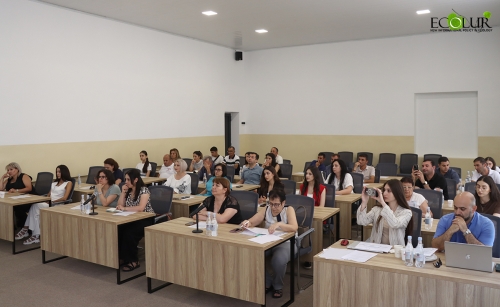

On July 29, 2025, a regional consultation was held at the municipality of Talin consolidated community, Aragatsotn Region, to assess community needs for the implementation of climate change mitigation and adaptation policies.

The event brought together Members of the National Assembly, representatives of Talin local government, the United Nations Development Programme (UNDP), the Ministry of Environment, civil society organizations, experts, and youth.

The purpose of the consultation was to raise awareness about Armenia's national climate commitments, particularly the Nationally Determined Contributions (NDCs) for 2021–2030, and to collect insights from local authorities, civil society, and youth regarding climate challenges, needs, and opportunities. It also provided a platform for direct dialogue with MPs.
The consultation was held within the framework of UNDP project “Fostering Responsive, Effective, Transparent, and Inclusive National Assembly of Armenia” (FORSETI), implemented with the financial support of the Governments of Sweden and Canada, in collaboration with the National Assembly of Armenia.
The initiative supports the Parliament in becoming more inclusive, transparent, and accountable to citizens, using various tools and platforms.
Ruzanna Hayrapetyan, FORSETI Project Coordinator, noted: “This is a platform for dialogue and exchange of knowledge and ideas. Our goal is not only to inform about climate programs, but also to listen to the communities — to hear what obligations they face, what challenges they encounter, and how we can find solutions together.
Today, we are discussing how climate change is affecting the Aragatsotn region and what steps are being taken to respond. At the same time, Members of Parliament will present their roles and responsibilities.”

Rustam Bakoyan, MP from “My Step” faction and Deputy Chair of NA Standing Committee on Human Rights Protection and Public Affairs, emphasized the importance of communities being on the front line of climate change impacts.
“Proper assessment of community needs is key to reducing risks effectively and taking long-term steps toward sustainable development.
To properly assess climate change, we must also study the country’s topography and regional climatic features — community by community.
As representatives of the legislative body, we are ready to listen to community concerns and present them in the form of legislative initiatives.”

Talin Mayor Tavros Sapeyan highlighted the significance of the event, saying such discussions provide real opportunities to voice local issues and find solutions. He expressed his gratitude to the organizers and stressed the community’s willingness to collaborate and share their development vision.

Diana Harutyunyan, Senior Advisor to the UNDP Climate Change Programme, stressed the importance of timely access to climate indicators and early warnings about extreme weather events.
She also addressed Talin’s international commitments:
“Talin has joined the EU Covenant of Mayors for the East initiative. Under this commitment, the community must develop a Sustainable Energy and Climate Action Plan (SECAP) that will guide it toward sustainable development. A key part of this process is establishing energy management systems at the local level — whether through designated energy managers or management frameworks.”

She recalled that back in 2023, with UNDP support, EcoLur Informational NGO conducted an analysis of Talin’s energy and climate resilience policy development process.
“Those findings are now serving as the basis for today’s renewed discussions. Talin faces complex climate conditions, yet it also has high potential for solar energy use. Several climate-focused subvention projects are already underway in the community, including energy-efficient building renovations and installation of solar panels in kindergartens and public buildings. What’s important is that the community clearly defines its needs — this becomes the foundation for directing national and donor-funded programs appropriately. It is crucial that the community be involved in this process. If residents recognize the problems and can propose solutions, they are empowered to voice their concerns and hold decision-makers accountable.”
Upcoming publications will present Talin community’s specific climate risks, proposals for mitigation and adaptation, and perspectives from experts and local residents.
August 06, 2025 at 13:40
